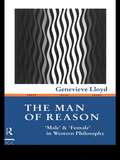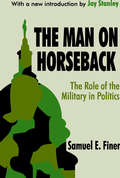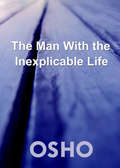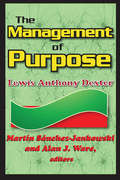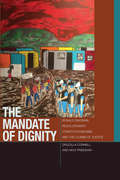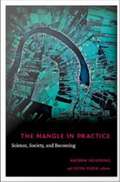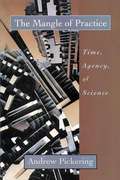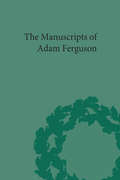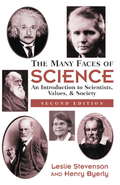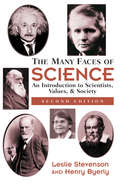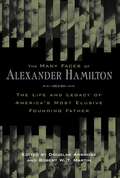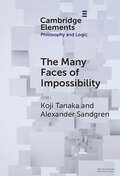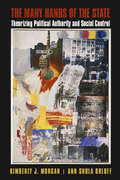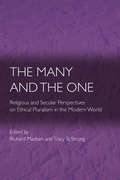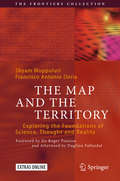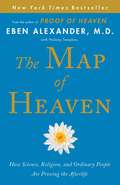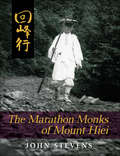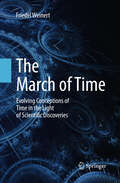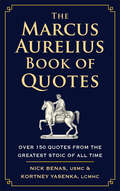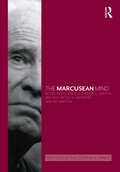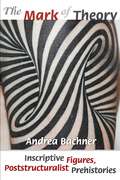- Table View
- List View
The Man of Reason: "Male" and "Female" in Western Philosophy (Ideas)
by Genevieve LloydThis new edition of Genevieve Lloyd's classic study of the maleness of reason in philosophy contains a new introduction and bibliographical essay assessing the book's place in the explosion of writing and gender since 1984.
The Man on Horseback: The Role of the Military in Politics
by Samuel FinerThe role of the military in a society raises a number of issues: How much separation should there be between a civil government and its army? Should the military be totally subordinate to the polity? Or should the armed forces be allowed autonomy in order to provide national security? Recently, the dangers of military dictatorships-as have existed in countries like Panama, Chile, and Argentina-have become evident. However, developing countries often lack the administrative ability and societal unity to keep the state functioning in an orderly and economically feasible manner without military intervention.Societies, of course, have dealt with the realities of these problems throughout their histories, and the action they have taken at any particular point in time has depended on numerous factors. In the ""first world"" of democratic countries, the civil-military relationship has been thoroughly integrated, and indeed by most modern standards this is seen as essential. However, several influential Western thinkers have developed theories arguing for the separation of the military from any political or social role. Samuel Huntington, emphasized that professionalism would presuppose that the military should intervene as little as possible in the political sphere. Samuel E. Finer, in contrast, emphasizes that a government can be efficient enough way to keep the civil-military relationship in check, ensuring that the need for intervention by the armed forces in society would be minimal. At the time of the book's original publication, perhaps as a consequence of a post-World War II Cold War atmosphere, this was by no means a universally accepted position. Some considered the military to be a legitimate threat to a free society. Today's post-Cold War environment is an appropriate time to reconsider Finer's classic argument.The Man on Horseback continues to be an important contribution to the study of the military's role in the realm of politics, and will be of interest to stu
The Man with the Inexplicable Life
by Osho Osho International FoundationThe story of Mojud which Osho introduces here is one of the greatest stories. It has that special flavor that only a Sufi story can have. It is incomparable. It is not just a story; Sufi stories are not just stories. They are not to entertain, but they are teaching devices.This story describes the path or the journey of spiritual discovery, personal transformation and growth.Osho says: "So listen to this story as attentively as possible. Let this story sink into your being. This story can open a door, this story can become such a radical change in your life that you may never be the same again. But the story has to be understood very minutely, very carefully, very lovingly, because it is a strange tale."
The Management of Purpose
by Lewis Anthony DexterLewis Anthony Dexter may well have been one of the better known and least appreciated political scientists of the last century. This outstanding collection of Dexter's writings, demonstrates why Dexter remains important. The volume off ers solid reasons for researching the topics Dexter pioneered, and is a masterful guide to his thought and analyses. Dexter's writings derive from a multifaceted career. The Management of Purpose is organized into three broad subject areas: sociology, political science, and practicing social science. Dexter's notions of what constituted sociology and anthropology and his understandings of these areas and how to use them to illumine political matters are unusual. His use of multiple types of evidence, including history and logic, enables him to make significant contributions to the study of society's response to social problems. His work on labeling theory shows that social labels have a power that both transcends and distorts reality. Dexter was also a pioneer in the interactionist perspective, linking the labeled and those doing the labeling, and in demonstrating how organizations tend to compartmentalize and specialize. Dexter's work provides the analytic tools to enable readers to better understand many of the issues that remain a part of the American political landscape.
The Mandate of Dignity: Ronald Dworkin, Revolutionary Constitutionalism, and the Claims of Justice (Just Ideas)
by Drucilla Cornell Nick FriedmanA major American legal thinker, the late Ronald Dworkin also helped shape new dispensations in the Global South. In South Africa, in particular, his work has been fiercely debated in the context of one of the world’s most progressive constitutions. Despite Dworkin’s discomfort with that document’s enshrinement of “socioeconomic rights,” his work enables an important defense of a jurisprudence premised on justice, rather than on legitimacy.Beginning with a critical overview of Dworkin’s work culminating in his two principles of dignity, Cornell and Friedman turn to Kant and Hegel for an approach better able to ground the principles of dignity Dworkin advocates. Framed thus, Dworkin’s challenge to legal positivism enables a theory of constitutional revolution in which existing legal structures are transformatively revalued according to ethical mandates. By founding law on dignity, Dworkin begins to articulate an ethical jurisprudence responsive to the lived experience of injustice. This book, then, articulates a revolutionary constitutionalism crucial to the struggle for decolonization.
The Mangle in Practice: Science, Society, and Becoming
by Andrew Pickering Keith GuzikIn The Mangle of Practice (1995), the renowned sociologist of science Andrew Pickering argued for a reconceptualization of research practice as a "mangle," an open-ended, evolutionary, and performative interplay of human and non-human agency. While Pickering's ideas originated in science and technology studies, this collection aims to extend the mangle's reach by exploring its application across a wide range of fields including history, philosophy, sociology, geography, environmental studies, literary theory, biophysics, and software engineering. The Mangle in Practice opens with a fresh introduction to the mangle by Pickering. Several contributors then present empirical studies that demonstrate the mangle's applicability to topics as diverse as pig farming, Chinese medicine, economic theory, and domestic-violence policing. Other contributors offer examples of the mangle in action: real-world practices that implement a self-consciously "mangle-ish" stance in environmental management and software development. Further essays discuss the mangle as philosophy and social theory. As Pickering argues in the preface, the mangle points to a shift in interpretive sensibilities that makes visible a world of de-centered becoming. This volume demonstrates the viability, coherence, and promise of such a shift, not only in science and technology studies, but in the social sciences and humanities more generally. Contributors: Lisa Asplen, Dawn Coppin, Adrian Franklin, Keith Guzik, Casper Bruun Jensen,Yiannis Koutalos, Brian Marick, Randi Markussen, Andrew Pickering, Volker Scheid, Esther-Mirjam Sent, Carol Steiner, Maxim Waldstein
The Mangle of Practice: Time, Agency, and Science
by Andrew PickeringAndrew Pickering offers a new approach to the unpredictable nature of change in science, taking into account the extraordinary number of factors—social, technological, conceptual, and natural—that interact to affect the creation of scientific knowledge.
The Manuscripts of Adam Ferguson
by Robin C DixThis volume contains a newly-edited cache of over 30 manuscript essays on a diverse range of topics and descriptions.
The Many Faces Of Science
by Henry Byerly Leslie StevensonProvides information and philosophical reflections on the institution of modern science and its impact on our lives and cultures. This second edition presents new material on topics such as AIDS, women in science, and recent work in psychology and the social sciences. Discussion of science and values is extended in this edition, as well as discussion of technology. Treatment is rich with case studies, anecdotes, and personal asides. Useful for courses on science studies, sociology, and political science. Stevenson is reader in logic and metaphysics at the University of St. Andrews, Scotland. Byerly is affiliated with the University of Arizona. Annotation c. Book News, Inc. , Portland, OR (booknews. com)
The Many Faces Of Science
by Henry Byerly Leslie StevensonThe development of modern science, and its increasing impact on our lives and cultures, is one of the great stories of our time. So, understanding--and coming to terms with--the institution of modern science should be an integral part of education. In The Many Faces of Science, Leslie Stevenson and Henry Byerly masterfully, and painlessly, provide the basic information and the philosophical reflection students need to gain such understanding. The authors make good use of case study methods, and they introduce us to dozens of figures from the history of science. Stevenson and Byerly provide an elementary sketch of the development of science through the lives of its practitioners, and they examine the often mixed motives of scientists, as well as the conflicting values people bring to science--and to their perceptions of its impact on society. The authors also explore the relationship between scientific practice and political and economic power.Accessible and rich with anecdotes, personal asides, and keen insight, The Many Faces of Science is the ideal interdisciplinary introduction for nonscientists in courses on science studies, science and society, and science and human values. It will also prove useful as supplementary reading in courses on science and philosophy, sociology, and political science. In this second edition of The Many Faces of Science, the authors have updated topics that they explore in the first edition, and they present new case studies on subjects such as HIV and AIDS, women in science, and work done in psychology and the social sciences. The authors also extend their discussion of science and values, in addition to revising their study of science and technology to emphasize changes in scientific practice today.
The Many Faces Of Science
by Henry Byerly Leslie StevensonThe development of modern science, and its increasing impact on our lives and cultures, is one of the great stories of our time. So, understanding--and coming to terms with--the institution of modern science should be an integral part of education. In The Many Faces of Science, Leslie Stevenson and Henry Byerly masterfully, and painlessly, provide the basic information and the philosophical reflection students need to gain such understanding. The authors make good use of case study methods, and they introduce us to dozens of figures from the history of science. Stevenson and Byerly provide an elementary sketch of the development of science through the lives of its practitioners, and they examine the often mixed motives of scientists, as well as the conflicting values people bring to science--and to their perceptions of its impact on society. The authors also explore the relationship between scientific practice and political and economic power. Accessible and rich with anecdotes, personal asides, and keen insight, The Many Faces of Science is the ideal interdisciplinary introduction for nonscientists in courses on science studies, science and society, and science and human values. It will also prove useful as supplementary reading in courses on science and philosophy, sociology, and political science. In this second edition of The Many Faces of Science, the authors have updated topics that they explore in the first edition, and they present new case studies on subjects such as HIV and AIDS, women in science, and work done in psychology and the social sciences. The authors also extend their discussion of science and values, in addition to revising their study of science and technology to emphasize changes in scientific practice today.
The Many Faces Of Science
by Henry Byerly Leslie StevensonThe development of modern science, and its increasing impact on our lives and cultures, is one of the great stories of our time. So, understanding--and coming to terms with--the institution of modern science should be an integral part of education. In The Many Faces of Science, Leslie Stevenson and Henry Byerly masterfully, and painlessly, provide the basic information and the philosophical reflection students need to gain such understanding. The authors make good use of case study methods, and they introduce us to dozens of figures from the history of science. Stevenson and Byerly provide an elementary sketch of the development of science through the lives of its practitioners, and they examine the often mixed motives of scientists, as well as the conflicting values people bring to science--and to their perceptions of its impact on society. The authors also explore the relationship between scientific practice and political and economic power.Accessible and rich with anecdotes, personal asides, and keen insight, The Many Faces of Science is the ideal interdisciplinary introduction for nonscientists in courses on science studies, science and society, and science and human values. It will also prove useful as supplementary reading in courses on science and philosophy, sociology, and political science. In this second edition of The Many Faces of Science, the authors have updated topics that they explore in the first edition, and they present new case studies on subjects such as HIV and AIDS, women in science, and work done in psychology and the social sciences. The authors also extend their discussion of science and values, in addition to revising their study of science and technology to emphasize changes in scientific practice today.
The Many Faces Of Science: An Introduction To Scientists, Values, And Society
by Henry ByerlyThe development of modern science, and its increasing impact on our lives and cultures, is one of the great stories of our time. So, understanding--and coming to terms with--the institution of modern science should be an integral part of education. In The Many Faces of Science, Leslie Stevenson and Henry Byerly masterfully, and painlessly, provide the basic information and the philosophical reflection students need to gain such understanding. The authors make good use of case study methods, and they introduce us to dozens of figures from the history of science. Stevenson and Byerly provide an elementary sketch of the development of science through the lives of its practitioners, and they examine the often mixed motives of scientists, as well as the conflicting values people bring to science--and to their perceptions of its impact on society. The authors also explore the relationship between scientific practice and political and economic power.Accessible and rich with anecdotes, personal asides, and keen insight, The Many Faces of Science is the ideal interdisciplinary introduction for nonscientists in courses on science studies, science and society, and science and human values. It will also prove useful as supplementary reading in courses on science and philosophy, sociology, and political science. In this second edition of The Many Faces of Science, the authors have updated topics that they explore in the first edition, and they present new case studies on subjects such as HIV and AIDS, women in science, and work done in psychology and the social sciences. The authors also extend their discussion of science and values, in addition to revising their study of science and technology to emphasize changes in scientific practice today.
The Many Faces of Alexander Hamilton: The Life and Legacy of America's Most Elusive Founding Father
by Robert W. Martin Douglas AmbroseThis anthology presents a variety of scholarly perspectives on the nation&’s most enigmatic Founding Father. Revolutionary War officer, co-author of the Federalist Papers, our first Treasury Secretary, Thomas Jefferson&’s nemesis, and victim of a fatal duel with Aaron Burr: Alexander Hamilton&’s legacy is complex, multifaceted, and difficult to pin down. On the one hand, Hamilton was the quintessential Founding Father, playing a central role in every key debate and event in the Revolutionary and Early Republic eras. On the other hand, he has received far less popular and scholarly attention than his brethren. Was Hamilton a closet monarchist or a sincere republican? A victim of partisan politics or one of its most active promoters? A lackey for British interests or a foreign policy mastermind? The Many Faces of Alexander Hamilton addresses these and other perennial questions. Leading Hamilton scholars, both historians and political scientists alike, present fresh evidence and new, sometimes competing, interpretations of the man, his thought, and the legacy he has had on America and the world.
The Many Faces of Impossibility (Elements in Philosophy and Logic)
by Koji Tanaka Alexander SandgrenPossible worlds have revolutionised philosophy and some related fields. But, in recent years, tools based on possible worlds have been found to be limited in many respects. Impossible worlds have been introduced to overcome these limitations. This Element aims to raise and answer the neglected question of what is characteristically impossible about impossible worlds. The Element sheds new light on the nature of impossible worlds. It also aims to analyse the main features and utility of impossible worlds and examine how impossible worlds can capture distinctions which are unavailable if we limit ourselves to possible world-based tools.
The Many Hands of the State
by Morgan Kimberly J. Orloff Ann SholaThe state is central to social scientific and historical inquiry today, reflecting its importance in domestic and international affairs. States kill, coerce, fight, torture, and incarcerate, yet they also nurture, protect, educate, redistribute, and invest. It is precisely because of the complexity and wide-ranging impacts of states that research on them has proliferated and diversified. Yet, too many scholars inhabit separate academic silos, and theorizing of states has become dispersed and disjointed. This book aims to bridge some of the many gaps between scholarly endeavors, bringing together scholars from a diverse array of disciplines and perspectives who study states and empires. The book offers not only a sample of cutting-edge research that can serve as models and directions for future work, but an original conceptualization and theorization of states, their origins and evolution, and their effects.
The Many and the One: Religious and Secular Perspectives on Ethical Pluralism in the Modern World (Ethikon Series in Comparative Ethics)
by Richard Madsen & Tracy B. StrongThe war on terrorism, say America's leaders, is a war of Good versus Evil. But in the minds of the perpetrators, the September 11 attacks on New York and Washington were presumably justified as ethically good acts against American evil. Is such polarization leading to a violent "clash of civilizations" or can differences between ethical systems be reconciled through rational dialogue? This book provides an extraordinary resource for thinking clearly about the diverse ways in which humans see good and evil. In nine essays and responses, leading thinkers ask how ethical pluralism can be understood by classical liberalism, liberal-egalitarianism, critical theory, feminism, natural law, Confucianism, Islam, Judaism, and Christianity. Each essay addresses five questions: Is the ideal society ethically uniform or diverse? Should the state protect, ban, or otherwise intervene in ethically based differences? How should disagreements on the rights and duties of citizens be dealt with? Should the state regulate life-and-death decisions such as euthanasia? To what extent should conflicting views on sexual relationships be accommodated? This book shows that contentious questions can be discussed with both incisiveness and civility. The editors provide the introduction and Donald Moon, the conclusion. The contributors are Brian Barry, Joseph Boyle, Simone Chambers, Joseph Chan, Christine Di Stefano, Dale F. Eickelman, Menachem Fisch, William Galston, John Haldane, Chandran Kukathas, David Little, Muhammad Khalid Masud, Carole Pateman, William F. Scheuerman, Adam B. Seligman, James W. Skillen, James Tully, and Lee H. Yearley.
The Map and the Territory
by Shyam Wuppuluri Francisco Antonio DoriaThis volume presents essays by pioneering thinkers including Tyler Burge, Gregory Chaitin, Daniel Dennett, Barry Mazur, Nicholas Humphrey, John Searle and Ian Stewart. Together they illuminate the Map/Territory Distinction that underlies at the foundation of the scientific method, thought and the very reality itself. It is imperative to distinguish Map from the Territory while analyzing any subject but we often mistake map for the territory. Meaning for the Reference. Computational tool for what it computes. Representations are handy and tempting that we often end up committing the category error of over-marrying the representation with what is represented, so much so that the distinction between the former and the latter is lost. This error that has its roots in the pedagogy often generates a plethora of paradoxes/confusions which hinder the proper understanding of the subject. What are wave functions? Fields? Forces? Numbers? Sets? Classes? Operators? Functions? Alphabets and Sentences? Are they a part of our map (theory/representation)? Or do they actually belong to the territory (Reality)? Researcher, like a cartographer, clothes (or creates?) the reality by stitching multitudes of maps that simultaneously co-exist. A simple apple, for example, can be analyzed from several viewpoints beginning with evolution and biology, all the way down its microscopic quantum mechanical components. Is there a reality (or a real apple) out there apart from these maps? How do these various maps interact/intermingle with each other to produce a coherent reality that we interact with? Or do they not?Does our brain uses its own internal maps to facilitate “physicist/mathematician” in us to construct the maps about the external territories in turn? If so, what is the nature of these internal maps? Are there meta-maps? Evolution definitely fences our perception and thereby our ability to construct maps, revealing to us only those aspects beneficial for our survival. But the question is, to what extent? Is there a way out of the metaphorical Platonic cave erected around us by the nature? While “Map is not the territory” as Alfred Korzybski remarked, join us in this journey to know more, while we inquire on the nature and the reality of the maps which try to map the reality out there. The book also includes a foreword by Sir Roger Penrose and an afterword by Dagfinn Follesdal.
The Map of Heaven: How Science, Religion, and Ordinary People Are Proving the Afterlife
by Ptolemy Tompkins Eben AlexanderThe author of the #1 New York Times bestseller Proof of Heaven teams up with the sages of times past, modern scientists, and with ordinary people who have had profound spiritual experiences to show the reality of heaven and our true identities as spiritual beings.When Proof of Heaven was published, some readers contacted Dr. Eben Alexander to argue that his near-death experience was impossible. But many more have written to say his story resonated with them in profound ways. Thanks to them, Dr. Alexander came to realize that sharing his story has allowed people to rediscover what so many in ancient times knew: there is more to life--and to the universe--than this single earthly life. Dr. Alexander met and heard from thousands of individuals whom his story has affected. He, with coauthor Ptolemy Tompkins, also studied what the world's religious traditions, philosophers, and scientists have had to say about the soul's survival of death. He has been deeply surprised at how often those voices from the past sync up with what he hears from people today. In The Map of Heaven, he shares some of the stories that people have told him and links them to what the world's spiritual traditions and its latest scientific insights have to say about the journey of the soul. Part metaphysical and scientific detective story, part manual for living, The Map of Heaven explores humankind's spiritual history and the progression of modern science from its birth in the seventeenth century, showing how we forgot, and are now at last remembering, who we really are and what our destiny truly is.
The Marathon Monks of Mount Hiei
by John StevensThe greatest athletes in the world today are not the Olympic champions or the stars of professional sports, but the "marathon monks" of Japan's sacred Mount Hiei. Over a seven-year training period, these "running buddhas" figuratively circle the globe on foot. During one incredible 100-day stretch, they cover 52.5 miles daily--twice the length of an Olympic marathon. And the prize they seek to capture is the greatest thing a human being can achieve: enlightenment in the here and now. This book is about these amazing men, the magic mountain on which they train, and the philosophy of Tendai Buddhism, which inspires them in their quest for the supreme. The reader will learn about the monks' death-defying fasts, their vegetarian training diet, their handmade straw running shoes, and feats of endurance such as their ceremonial leap into a waterfall. Illustrated with superb photographs, the book also contains the first full-length study in English of Mount Hiei and Tendai Buddhism. John Stevens lived in Japan for thirty-five years, where he was a professor of Buddhist studies at Tohoku Fukushi University in Sendai. Stevens is a widely respected translator, an ordained Buddhist priest, a curator of several major exhibitions of Zen art, and an aikido instructor. He has authored more than thirty books and is one of the foremost Western experts on aikido, holding a ranking of 7th dan Aikikai. Stevens has also studied calligraphy for decades, authoring the classic Sacred Calligraphy of the East. Other John Stevens titles that are likely to be of interest include Extraordinary Zen Masters and The Philosophy of Aikido.
The March of Time
by Friedel WeinertThe aim of this interdisciplinary study is to reconstruct the evolution of our changing conceptions of time in the light of scientific discoveries. It will adopt a new perspective and organize the material around three central themes, which run through our history of time reckoning: cosmology and regularity; stasis and flux; symmetry and asymmetry. It is the physical criteria that humans choose - relativistic effects and time-symmetric equations or dynamic-kinematic effects and asymmetric conditions - that establish our views on the nature of time. This book will defend a dynamic rather than a static view of time.
The Marcus Aurelius Book of Quotes: Over 150 Quotes from the Greatest Stoic of All Time
by Nick Benas Kortney YasenkaDiscover the timeless wisdom of Marcus Aurelius, one of history's greatest Stoic philosophers, in this compelling collection of quotes and sayings.Marcus Aurelius lived a life that epitomized the principles of Stoicism, gaining profound control over his thoughts, emotions, and actions. The Marcus Aurelius Book of Quotes brings together over 150 of his most insightful sayings, musings, and observations, offering readers a treasure trove of wisdom.In a world where many strive to improve their lives, find happiness, and achieve fulfillment, Marcus Aurelius' teachings provide enduring guidance. His reflections address fundamental questions such as:• What will make me feel more fulfilled?• How can I build stronger relationships?• What contributes to a successful and meaningful life?• How can I live free from anxiety and depression?The teachings of Marcus Aurelius offer a roadmap to a balanced, contented, and purposeful life. The wisdom contained in The Marcus Aurelius Book of Quotes continues to resonate, offering clarity and direction for those seeking to navigate the complexities of modern living.
The Marcusean Mind (Routledge Philosophical Minds)
by Eduardo Altheman C. Santos Jina Fast Nicole K. Mayberry Sid SimpsonHerbert Marcuse (1898–1979) was a member of the Frankfurt School, a leading figure of 1960s counterculture, and a fundamental character for the New Left. His ideas and theories, inspired by a rich fusion of Marxian and Freudian thought, exert a strong influence on contemporary thinking about activism, emancipation, and political resistance. He was also a student of Martin Heidegger in the late 1920s and engaged deeply with philosophy throughout his career.The Marcusean Mind is an outstanding survey and assessment of Marcuse's thought. Beginning with a thorough introduction to Marcuse's life and work, 39 chapters by an international and interdisciplinary team of contributors are organized into five clear parts: Intellectual Ecosystems of Marcuse Reason and Sensibilities Futures and Utopias Contemporary Movements Counterrevolutions, Neoliberalism, and Fascism These sections each contain a short introduction, after which Marcusean ideas are brought to bear on many key contemporary debates and issues across the humanities, social sciences, and science and technology.Including a Foreword by Craig Calhoun and an Afterword by Douglas Kellner, The Marcusean Mind is a superb resource for anyone interested in Marcuse's thought and its legacy. It is valuable reading for students of contemporary political theory, activism, philosophy, sociology, media and cultural studies, critical legal studies, and race and gender studies.
The Mark of Theory: Inscriptive Figures, Poststructuralist Prehistories
by Andrea BachnerWhat imaginaries, tropes, and media have shaped how we theorize? The Mark of Theory argues that inscription constitutes one of the master metaphors of contemporary theory.As a trope that draws on a wide array of practices of marking, from tattooing to circumcision, from photographic imprints and phonographic grooves to marks on a page, inscription provides an imaginary that orients and irritates theoretical thought. Tracing inscriptive imaginaries from the late nineteenth century to today, The Mark of Theory offers a wide-ranging conceptual genealogy of contemporary thought. Navigating poststructuralism’s attention to figurative language as well as media theory’s attention to objects, phenomena, and practices of mediation, the book works through core questions for how we theorize. Across a range of disciplines and scholarly conversations—from literature and media to anthropology, race and gender, art, psychoanalysis, sound, and ultimately ethics—sites of inscription come to constitute the past legacy of a thought to come, a prehistory of our current moment.In focusing on materiality and mediation The Mark of Theory shows how inscriptive practices shape conceptual thought, as well as political and ethical choices. By contextualizing the fraught relationship between materiality and signification, The Mark of Theory lays the ground for a politics of theory that begins there where theory and politics are no longer conflated.
The Market as God
by Harvey CoxThe Market has deified itself, according to Harvey Cox's brilliant exegesis. And all of the world's problems--widening inequality, a rapidly warming planet, the injustices of global poverty--are consequently harder to solve. Only by tracing how the Market reached its divine status can we hope to restore it to its proper place as servant of humanity.
